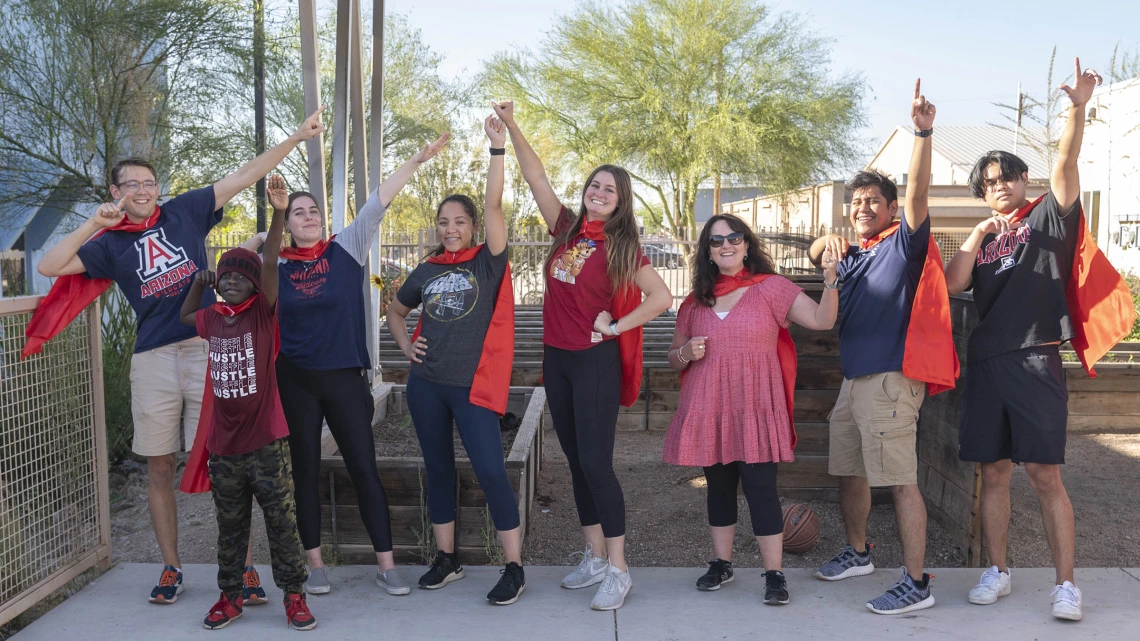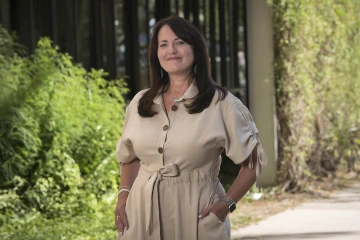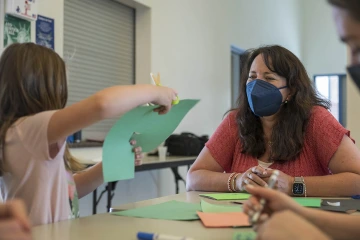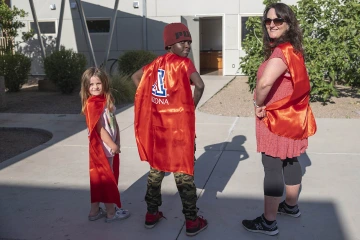Continuing a Legacy of Health Education and Outreach
Sabrina Plattner comes from a family dedicated to health education and is building on that legacy with a focus on preventing childhood obesity.

Sabrina Plattner (third from right), senior health educator at the Zuckerman College of Public Health, has dedicated her career to promoting programs that foster healthy lifestyle principles for eating and exercise to reduce childhood obesity.
You could say Sabrina Plattner, MEd, has health and wellness in her DNA.
Plattner, a senior health educator in the University of Arizona Mel and Enid Zuckerman College of Public Health, grew up in Tucson, the daughter of Heather and David Alberts, MD. Her father joined the College of Medicine – Tucson in 1975 and, a year later, helped found the UArizona Cancer Center, where he developed one of the nation’s top cancer prevention and control programs. He served as center director from 2005 to 2013 and created the Skin Cancer Institute in 2006. A Regents Professor and Director Emeritus, he retired in 2015.

Plattner is co-chair of Activate Tucson, which is partnering with Catalyzing Communities to Prevent Obesity to host a community symposium on childhood obesity early this fall.
With parents like that, it was almost inevitable Plattner would pursue a career in health and wellness. Today, her work involves developing nutrition, fitness and wellness curriculum, related programs and community initiatives to prevent childhood obesity in Tucson. She does this not only as part of the Zuckerman College of Public Health’s Health Promotion Sciences Department, but also in collaboration with institutions and organizations across the country.
Plattner’s efforts include the College of Public Health’s Healthy Schools Tucson, a partnership with area schools to provide health and wellness lessons to children. Locally, she serves as co-chair of Activate Tucson, a position she shares with Annemarie Medina, MBA, director of corporate and community relations for UArizona Health Sciences. Activate Tucson is an advocacy coalition that unites area agencies, groups and people dedicated to health and wellness in southern Arizona.
Activate Tucson and its Tucson Child Health Working Group are stakeholder partners in the Catalyzing Communities to Prevent Obesity initiative, a national study led by Boston’s Tufts University. The initiative seeks to prevent childhood obesity and foster healthy communities in 10 cities including Tucson.
Plattner is humble about her involvement, but proud of the heritage behind it.
“My parents were very involved with prevention in the area of health and wellness,” she said. “My upbringing stuck with me as a young adult and has carried with me through my life.”
Helping kids establish healthy habits
Plattner earned her master’s degree in elementary education and health promotion from Lesley University, near Boston, after completing her undergraduate studies at Northern Arizona University. She got her start at UArizona in 2004 with Healthy Children Arizona, a health, wellness and disease-prevention program focused on nutrition, physical activity and sun safety.

Healthy Schools Tucson lessons developed in public health classes taught by Plattner are tailored to address childhood obesity and include topics on nutrition, a balanced diet, body image and stress management. The pilot program took place at St. Peter and Paul School.
Through Healthy Children Arizona, a partnership between the College of Agriculture and Life Sciences’ Department of Nutritional Sciences and the UArizona Cancer Center, she met her supervisor and mentor Cynthia Thomson, PhD, RDN, a Distinguished Professor with leadership roles at the center and both colleges. During the 10 years Plattner worked for Healthy Children Arizona, she coordinated outreach to elementary, middle and some high schools, reaching about 25,000 students.
Next, she joined the Pima Council on Aging, where she oversaw CATCH Healthy Habits. The national program combats obesity by engaging adults aged 50 and older as volunteers and mentors to teach lifelong healthy habits to kids in grades K-5. In 2016, Plattner returned to the College of Agriculture and Life Sciences and UArizona Cooperative Extension to coordinate the Arizona Health Zone, formerly known as the Arizona Nutrition Network and Supplemental Nutrition Assistance Program – Education (SNAP-Ed).
“I used to look at my mom and, think, ‘Wow, she has a really cool job.’ I never thought I would be doing similar work with a little different magnitude, but here I am. I love what I do.”Sabrina Plattner, MEd
Two years later she rejoined Dr. Thomson at the College of Public Health’s Zuckerman Family Center for Prevention and Health Promotion to head the Childhood Obesity Prevention Initiative. The initiative, funded by Frank Marcus, MD, a College of Medicine – Tucson Professor Emeritus and past cardiology chief, includes Healthy Schools Tucson and Wildcat Marathoners.
In early 2020, 1,100 students from four area elementary schools participated in Wildcat Marathoners, hosted with Cooperative Extension and Southern Arizona Roadrunners (SAR). The program encouraged school children to log miles at recess to reach half or full marathon distances of 13.1 or 26.2 miles. Participating students were invited to SAR’s FitKidz 1-mile fun run on the UArizona Mall, and all students who completed at least 12.1 miles during the program received a red superhero cape after running their last mile on campus.
“The cape has a big UArizona emblem on it, and the kids love it,” Plattner said, adding that 112 students received capes in 2020. “We actually had 17 kids, ages 5 to 14, show up at the Thanksgiving Cross Country race at Reid Park last fall. Other kids and parents asked about the capes. They thought they were so cool. They all wanted them!”
Wildcat Marathoners paused during the pandemic but was reinstated virtually in fall 2021 through the Primavera Foundation’s Las Abuelitas After-School Program. Plattner said she hopes to reignite in-person Wildcat Marathoners events post-pandemic.
Combining education and outreach
UArizona students enrolled in two of Plattner’s courses, “Public Health for Community Wellness” and “Public Health for School and Community Based Childhood Obesity Prevention Programming,” design lessons for middle schoolers as part of Healthy Schools Tucson. Basic lessons center on fitness and nutrition using U.S. Department of Agriculture MyPlate and Dietary and Physical Activity Guidelines. Other lessons, like “Sugar Busters,” “Portion Distortion” and “Me, Myself & I,” target things to avoid (sodas, candy and other sweets), rethink (overeating) or reframe (healthy body shape and size self-imaging) for a more positive outlook.

Wildcat Marathoners is a component of Plattner’s programming through Childhood Obesity Prevention Initiative. Elementary school students can earn a hero cape by logging miles they’ve run or walked at recess.
Lessons also cover social media and screen time moderation, the dangers of smoking and vaping, and self-care for stress. The stress lesson, which was developed first, centers on COVID-19, explaining what it is and the science behind social distancing, masking, testing and vaccines.
“Stress plays a huge role in disease, mental health and obesity,” Plattner said, adding that the effects of stress were amplified during the pandemic. “The stress lesson was developed to mitigate misinformation and reduce the worry children experienced at this time.”
All the lessons were created to be culturally relevant for Tucson’s diverse population. They are taught at St. Peter and Paul School with plans to expand to more schools in the future.
“I feel very fortunate these childhood obesity initiatives I helped start and create are still going and making headway through the pandemic, when almost everything was virtual and online,” Plattner said. “The thing that’s really great about the Healthy Schools Tucson program is we are staying relevant with kids about current issues coming up in their lives.”
Next, Plattner, Dr. Thomson and Jennifer Bea, PhD, co-director of the Body Composition Lab at the UArizona Collaboratory for Metabolic Disease Prevention and Treatment, plan to expand a local partnership with Head Start preschool programs to include Head Start programs across southern Arizona. It also involves parent, pediatrician and nurse training on childhood obesity prevention.
As part of the Catalyzing Communities alliance, they are preparing a communitywide campaign to convince taxpayers to dedicate a portion of available school tax credits to schools and school districts in less affluent areas. This is seen as an easy, cost-neutral way to fund extracurricular activities that promote child wellness and offset school funding disparities that can lead to increased obesity in underserved areas.
Plattner gets wistful thinking about how her parents’ careers, her mother’s in particular, and her own have paralleled each other.
“I used to look at my mom and, think, ‘Wow, she has a really cool job,’” she said. “She’d go to different places every day and do all this interesting and impactful stuff. I never thought I would be doing similar work with a little different magnitude, but here I am. I go out to community centers, schools, meetings with community partners and events in the same basic capacity of prevention to help create a healthy community. I love what I do. I feel grateful I’m in this position and able to be of service and to see the impact in our community.”

